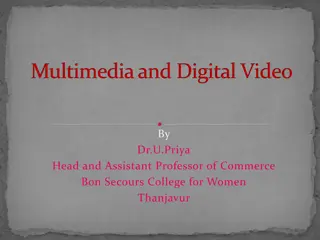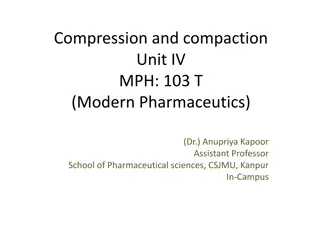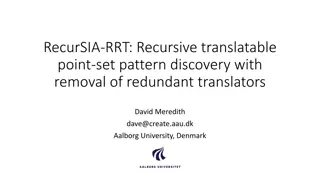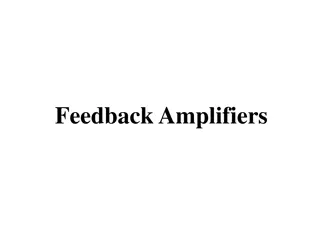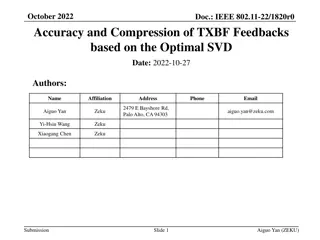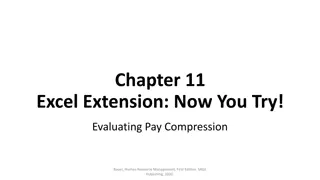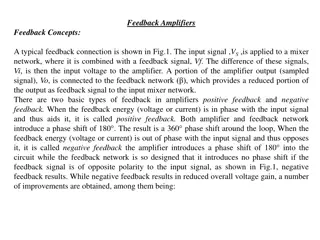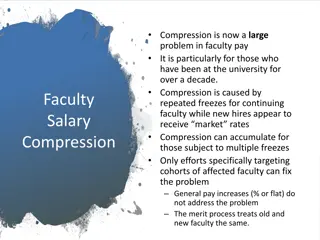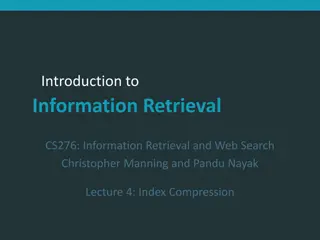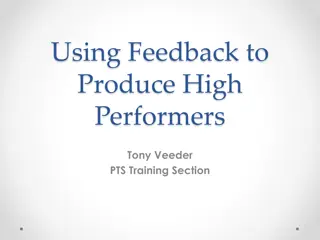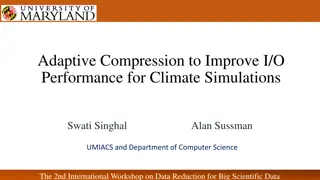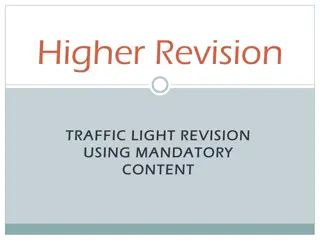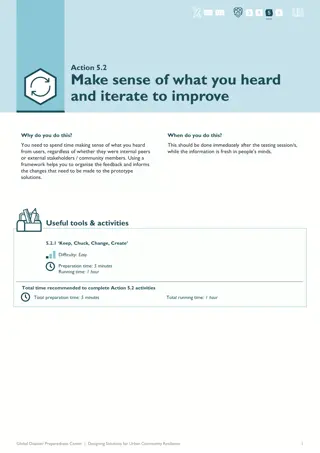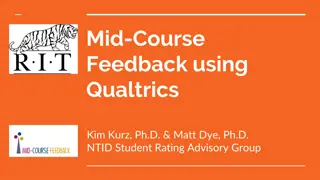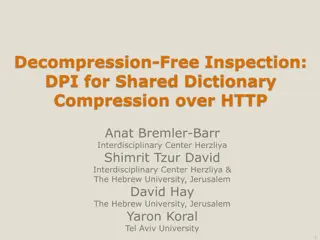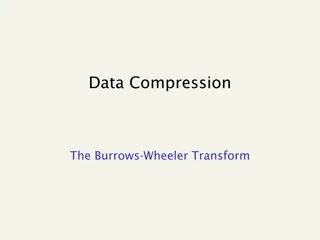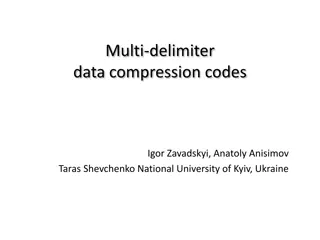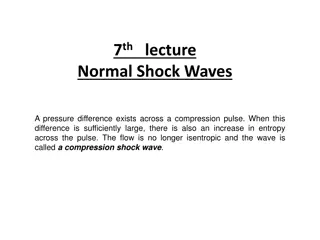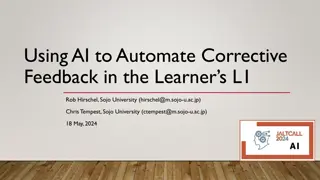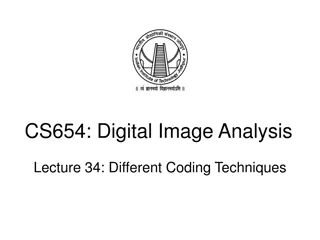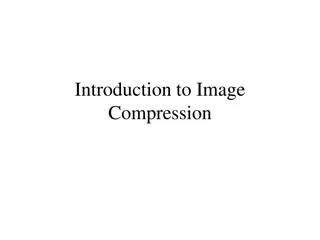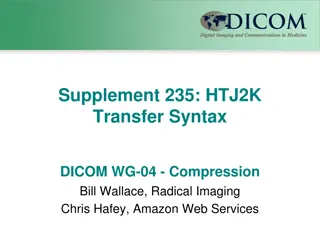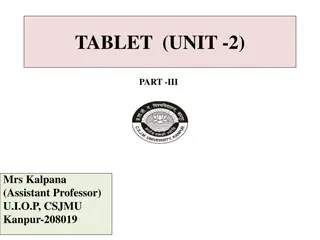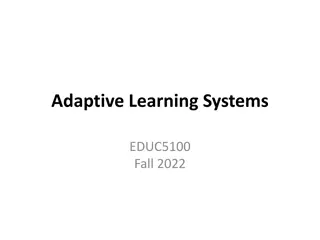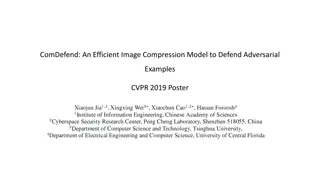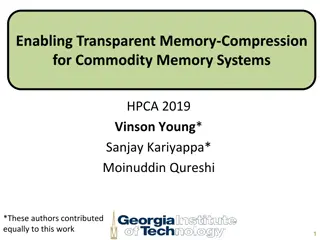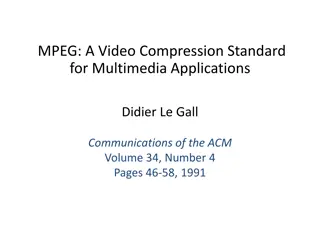Enhancing Student Learning Through Effective Feedback Strategies
Effective feedback plays a crucial role in improving student learning outcomes by providing specific information that students can use to enhance their performance. This content explores the importance of feedback, examples of good feedback practices, qualities of good feedback, and what components
5 views • 16 slides
Understanding Multimedia and Digital Video Concepts
Explore the world of multimedia and digital video through this informative content. Learn about the meaning of multimedia, stages of transport in multimedia, key concepts, compression methods, data compression in action, and compression techniques. Discover how multimedia combines text, audio, and i
0 views • 51 slides
Effective Feedback Strategies for Learning Enhancement
Feedback plays a crucial role in the learning process. This session focuses on strategies for providing effective feedback to improve learning outcomes, course, and assignment design, best practices, and tools for efficient feedback delivery. Understanding the importance of prompt feedback and diffe
3 views • 20 slides
Understanding Tablet Compression and Compaction in Modern Pharmaceutics
This educational material delves into the physics of tablet making, focusing on the forces involved, compaction profiles, and effects of friction. Students will gain knowledge about tablet compression, compaction, and consolidation, including the types of forces at play and the distribution of force
0 views • 16 slides
Compression-Driven Point Set Pattern Discovery in Music
Compression-driven point set pattern discovery in music explores the principle of parsimony in data representation. By applying compression-based algorithms, researchers aim to simplify the description of musical data, leading to better performance in tasks such as classification of folk songs, simu
0 views • 12 slides
Understanding Feedback Amplifiers: Structure, Properties, and Topologies
Electronic circuits rely heavily on feedback mechanisms, particularly negative feedback, for various purposes such as desensitizing gain, reducing distortion, controlling impedance, and improving amplifier bandwidth. This article explores the general structure of feedback, properties of negative fee
0 views • 68 slides
Enhancing Feedback Practices with Audio-Visual Technology: A Study on Student Satisfaction and Attainment
This presentation delves into the implementation of Audio-Visual Feedback (AVF) technology to improve assessment feedback practices in an educational institution. The study explores the impact of AVF on student satisfaction levels compared to traditional written feedback, as well as its influence on
0 views • 21 slides
Understanding the Importance of Feedback in Achievement Enhancement
Feedback plays a crucial role in encouraging or discouraging behavior, making it essential to provide constructive feedback that focuses on growth and improvement. Improper feedback can lead to incompetence in the workplace. Learn about the definition of feedback, how to give feedback effectively, a
2 views • 22 slides
IEEE 802.11-22/1820r0: Accuracy and Compression of TXBF Feedbacks
This document discusses the accuracy and compression of Transmit Beamforming (TXBF) feedbacks based on Optimal Singular Value Decomposition (SVD). It covers the background, optimal SVD-based TXBF feedback (Decimation), simulation results, and proposals for overhead reduction schemes in the context o
4 views • 17 slides
Excel Tutorial: Evaluating Pay Compression with Compa-Ratios
Learn how to evaluate pay compression using compa-ratios and tenure data in Excel. The tutorial guides you through calculating compa-ratios for customer service representatives, comparing actual pay to the pay range midpoint, and identifying potential pay compression issues.
0 views • 23 slides
Understanding Feedback Amplifiers in Electronic Circuits
Feedback amplifiers play a crucial role in electronic circuits by providing mechanisms for controlling gain, stability, and overall performance. There are two basic types of feedback - positive and negative, each offering distinct advantages. The four ways of connecting feedback signals involve volt
1 views • 18 slides
Addressing Faculty Salary Compression Issues in Higher Education
Faculty salary compression has become a significant challenge in higher education, particularly affecting long-serving faculty members. This issue arises from repeated freezes on the salaries of existing faculty while new hires receive higher market rates. General pay increases and merit processes d
0 views • 6 slides
Introduction to Information Retrieval: Compression Techniques and Index Optimization
Exploring concepts from information retrieval, this content delves into index compression methods such as blocked sort-based indexing and single-pass in-memory indexing. It discusses the importance of compression for inverted indexes to optimize memory usage and decrease disk space requirements, ult
2 views • 50 slides
Enhancing Feedback Strategies in ELA Learning Project Day
Refine understanding of ELA, engage with student exemplars, and design constructive feedback in a structured agenda. Activities include generating feedback, digging deeper into feedback processes, and considering the impact of timely and specific feedback on student growth in learning and skills. Co
0 views • 31 slides
Effective Feedback Strategies for Resident Teachers
Effective feedback is critical for the growth of resident teachers. This guide covers types of feedback, why it's important, what makes feedback effective, behaviorally anchored rating scales, models for giving feedback, and key tips for delivering feedback successfully.
0 views • 14 slides
Effective Feedback Strategies for High Performance
Feedback plays a crucial role in helping individuals improve performance and reach their full potential. From providing helpful feedback to reinforcing desired behaviors, this guide explores various strategies, including redirection, reinforcement, and F.A.S.T. feedback, to enhance workplace perform
0 views • 21 slides
Enhancing Postgraduate Academic Writing: Feedback Collaboration Model
Developing a collaborative model for postgraduate academic writing courses involves understanding the role of feedback, focusing on content feedback, and exploring the intersections between discipline specialist and writing tutor feedback to improve academic writing abilities. Feedback offers valuab
1 views • 27 slides
Enhancing I/O Performance Through Adaptive Data Compression in Climate Simulations
This research focuses on improving I/O performance for climate simulations by employing adaptive data compression techniques. Scientific data compression methods, such as lossy and lossless compression, are explored to reduce data volume and increase effective I/O bandwidth. The study highlights the
0 views • 18 slides
Understanding Data Storage and Compression Techniques
Explore various concepts related to data storage and compression, including higher revision techniques, watch points for debugging, RAID disk mirroring, media compression methods, mantissa and exponent representation, and the impact of precision/range adjustments in numerical calculations. Learn abo
0 views • 13 slides
Understanding DEFLATE Algorithm: LZ77, Huffman Coding, Compression
DEFLATE algorithm, developed by Kent, combines LZ77 compression with Huffman coding. LZ77 algorithm compresses data using a sliding window technique, while Huffman coding assigns variable-size codewords to characters based on frequency. This process enables efficient data compression and decompressi
0 views • 12 slides
Iterative Feedback Framework for Prototype Improvement
The iterative feedback framework involves making sense of user feedback using the Keep, Chuck, Change, Create (KCCC) model to iterate and enhance prototype solutions. This process helps organize input from testing sessions, informing necessary modifications for better outcomes. The framework emphasi
1 views • 26 slides
Understanding Mid-Course Feedback Using Qualtrics
Mid-Course Feedback (MCF) is a valuable process that allows students to provide feedback on their courses mid-semester, impacting teaching strategies, communication, materials, and more. This feedback benefits both students and instructors by improving teaching effectiveness, student satisfaction, a
0 views • 21 slides
Dictionary Compression and Deep Packet Inspection (DPI) Overview
This content discusses Decompression-Free Inspection (DPI) for shared dictionary compression over HTTP, the challenges and solutions in deep packet inspection (DPI), compressed HTTP methods, examples of intra-response and inter-response compression, and current operations of Network Intrusion Detect
0 views • 33 slides
Importance of Student and Staff Feedback in Educator Evaluation
Student and staff feedback plays a crucial role in educator evaluation, providing valuable insights into areas of strength and growth. Informed by evidence such as surveys, observations, and artifacts, feedback helps educators tailor their practice, fostering two-way communication and professional d
0 views • 14 slides
Multichannel EEG Compression Using COMPROMISE Study
A study on multichannel EEG compression using COMPROMISE by Duc Thien Pham, Josef Kohout, Ivana Kolingerova, Pavel Nejdar from the Department of Computer Science and Engineering, Faculty of Applied Sciences, University of West Bohemia. The study covers datasets, methods, and discussions related to E
0 views • 12 slides
Understanding the Burrows-Wheeler Transform and Suffix Array
Explore the concept of the Burrows-Wheeler Transform and Suffix Array, key algorithms in data compression. Learn about the transformation process, suffix arrays, compression techniques like Bzip, and how to compute the BWT. Discover the significant role these methods play in efficient data compressi
0 views • 10 slides
Comprehensive Overview of Multi-delimiter Data Compression Codes and Key Features
This content showcases the concept of multi-delimiter data compression codes, their application in various algorithms such as arithmetic, finite state entropy, Huffman, and Fibonacci. Key features including compression rate, synchronization, search in compressed files, encoding/decoding speed, and c
0 views • 27 slides
Understanding Cascade Control Systems in Industrial Processes
Cascade control systems play a crucial role in improving process control efficiency by incorporating feedback loops within feedback loops. This type of control architecture helps to better handle disturbances and variations in the process by creating secondary loops that monitor specific parameters.
0 views • 8 slides
Understanding Normal Shock Waves in Gas Dynamics
In gas dynamics, normal shock waves occur when there is a significant pressure difference across a compression pulse, leading to increased entropy. This results in non-isentropic flow known as compression shock waves. The formation of compression and expansion waves can be likened to piston movement
0 views • 16 slides
AI Automation for Corrective Feedback in Language Learning
Exploring the utilization of AI technology to automate and enhance corrective feedback in language learning, addressing challenges such as time constraints, delayed feedback, and student comprehension. Introduction of a new AI text tool by Marcus Green for accessible and effective feedback provision
0 views • 13 slides
IEEE 802.11-19/0709r0 - Immediate and Delayed Feedback May 2019
The document discusses immediate and delayed feedback mechanisms in IEEE 802.11-19/0709r0, focusing on parameters, feedback types, and ranging options. It explores variations in feedback direction and types, proposing options for phase shift feedback and distinguishing between RSTA-to-ISTA and ISTA-
0 views • 6 slides
Lossless Compression Techniques in Digital Image Analysis
Explore various coding techniques used for lossless compression in digital image analysis, including RLE, Huffman coding, arithmetic coding, LZW, and DPCM. Learn about run-length encoding, 2D RLE, and how DPCM encodes changes between consecutive samples to achieve compression while preserving image
0 views • 39 slides
Understanding Image Compression Techniques
Image compression is essential for reducing file sizes without significant loss of quality. This article explores three common techniques: Run-Length Encoding, Arithmetic Encoding, and their applications in data compression. Learn about encoding intervals, probability ranges, and decoding processes
0 views • 33 slides
Revolutionizing Image Compression with HTJ2K Transfer Syntax
Revolutionize image compression with HTJ2K Transfer Syntax, a groundbreaking technology that addresses existing challenges in compression standards like JPEG 2000. HTJ2K offers improved decode and encode speeds, strong open-source support, and scalable resolution access. Explore how HTJ2K is reshapi
0 views • 6 slides
Understanding Tablet Compression Machine Process
The process of tablet compression involves filling, compression, and ejection of granules to create tablets. Different types of tablet machines, such as single punch and multi-station rotary presses, are used in the process. Components like hoppers, dies, punches, cam tracks, and feeding mechanisms
0 views • 8 slides
Understanding Feedback in Learning Systems
Exploring the role of feedback in educational settings, this content delves into the concept of providing information to learners by various agents. It discusses the importance of feedback in guiding learning progress, highlighting examples of correctness feedback and correct answer feedback. The be
0 views • 66 slides
Efficient Image Compression Model to Defend Adversarial Examples
ComDefend presents an innovative approach in the field of computer vision with its efficient image compression model aimed at defending against adversarial examples. By employing an end-to-end image compression model, ComDefend extracts and downscales features to enhance the robustness of neural net
0 views • 16 slides
Enhancing Memory Bandwidth with Transparent Memory Compression
This research focuses on enabling transparent memory compression for commodity memory systems to address the growing demand for memory bandwidth. By implementing hardware compression without relying on operating system support, the goal is to optimize memory capacity and bandwidth efficiently. The a
0 views • 34 slides
Feedback and Mentoring Workshop for HIV Researchers
Mentoring workshop for HIV researchers focusing on giving and receiving feedback, nurturing early career investigators, and working with faculty continuum. The workshop offers insights on feedback exercises, assumptions, and rhetorical questions about feedback. Participants are encouraged to reflect
0 views • 33 slides
Overview of MPEG: Video Compression Standard
The MPEG video compression standard revolutionized multimedia applications by enabling full-motion video over networks. Introduced in 1988 by the Motion Picture Experts Group, MPEG-1 focused on video compression but also included audio, with notable advancements like MP3. This standard addressed the
0 views • 29 slides

